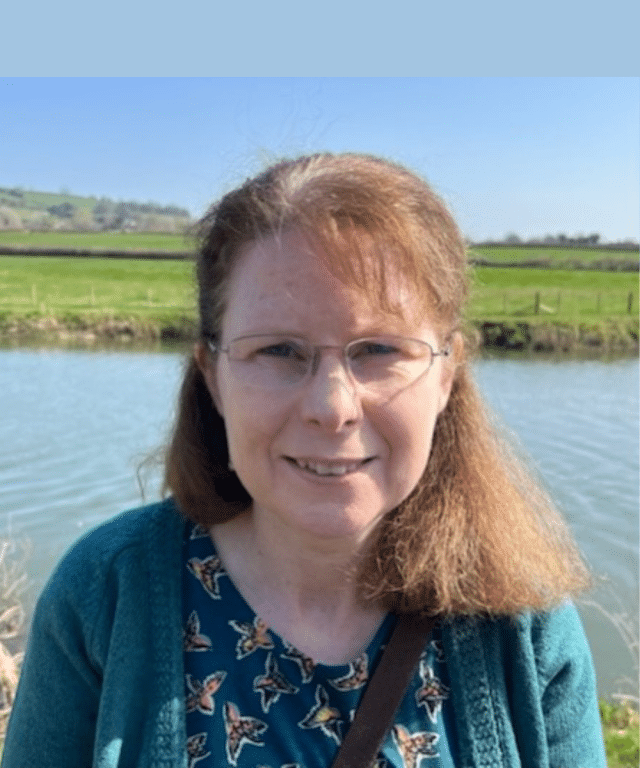
Bloxham inspired my career in science
Rachel is a Clinical Scientist in Audiology and leads the Audiology Service at Oxford University Hospitals. Most of Rachel’s role is leadership and management, however, she still has some clinical time, particularly assessing hearing in young children and balance function in adults. “OUH is a great place to work, as we cover all areas of audiology from age 0 to 100, including cochlear implants for severe/profound hearing loss.” Rachel is married with two teenage boys, and loves to do things as a family, particularly walks in the countryside and going out for nice meals. They are very involved with their local church where Rachel plays the flute in the music group.
You were one of the early cohorts of girls boarding in Stonehill. What are your fondest memories of school days?
I think my fondest memory of life at Bloxham was my time in the Chapel Choir, particularly when we sang in both Exeter and Gloucester cathedrals. I used to love the first choir practice back after school holidays and hearing the choir singing in four-part harmony again – there’s nothing like it. Another fond memory would be Mr Ekers my biology teacher drinking a pint of beer whilst standing on his head (to demonstrate peristalsis being independent of gravity, I think!). As for my time in Stonehill,
well I won’t mention the time when the boys broke into Stonehill House… via the fire escape which led from my bedroom…!
In what way did your time at Bloxham influence you?
I think my time at Bloxham gave my confidence in my academic ability which in turn led to me having high career aspirations. It also played a key part in me developing a life-long love of learning, which is partly why I chose a career in healthcare science.
My time at Bloxham gave me confidence in my academic ability which in turn led to me having high career aspirations
Which academic subject was most useful to your career?
Without hesitation I would say maths. My A Level in pure mathematics and statistics has helped me in many ways, particularly with the logical thought processes and methodologies required to be an effective scientist. The statistics part was fantastic preparation for a career in which I have performed statistical analyses for many research projects, several of which have been published.
Tell us a little about your journey afterleaving Bloxham’s Upper Sixth?
I went on to Durham University to do a BSc in Biological Sciences, followed by Southampton to do my MSc in Audiology. After that I spent time in audiology departments in London and Birmingham and then Cambridge where I led the balance service, managed training and collaborated in various research projects. We then moved to Bristol where I joined the University of Bristol to teach audiology, and this is when I decided to take the plunge and do my PhD which was about balance in children. After a few years working at the hospital in Bristol, I then moved across to Bath to head up the children’s audiology service. I joined OUH in my current role in late 2020.
Who or what has been most inspirational to you in your life?
I have had the privilege of having a couple of excellent Christian managers during my career journey. Both have modelled excellent leadership behaviours and shown their faith in action – which has inspired me to do the same in my role.
What advice would you give to anyone wanting to pursue a career in healthcare science?
Healthcare scientists are definitely the unsung heroes of the NHS – when have you ever heard of us mentioned alongside “doctors and nurses”? We make up 5% of the NHS workforce, but our work underpins over 80% of clinical decisions (think of lab-based staff analysing blood or tissue samples, medical physicists working in radiotherapy, cardiology scientists measuring heart function, etc., as well as audiologists who assess and manage hearing loss in adults and children). With over 50 different specialities, some patient-facing and some not, it is worth getting some work experience in one or two fields to ensure that you really understand what your chosen profession involves and whether you have the right aptitude for it. If you want to help or work with people yet use your scientific skills, then this could be the career pathway for you (without the stresses or long hours of a career in medicine).
What’s the best piece of advice you have received?
“It’ll be OK – whatever’s happened, the sun will still rise tomorrow.”
If you could learn a new skill, what would it be?
Being able to park a car into a tiny space!
What would you put into Room 101?
Definitely the inappropriate use (or non-use) of apostrophes – drives me mad!
Back to all stories

